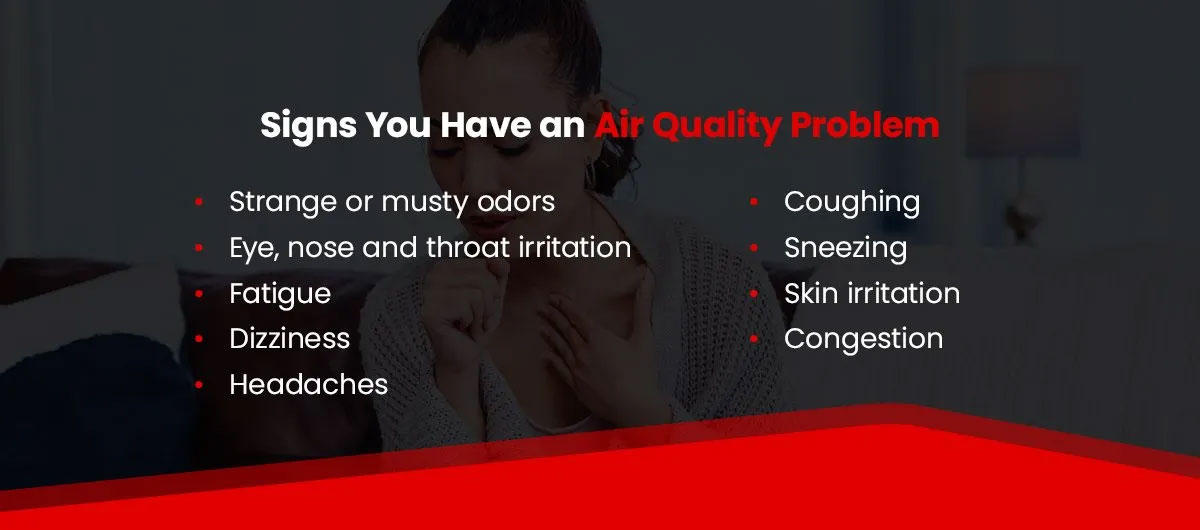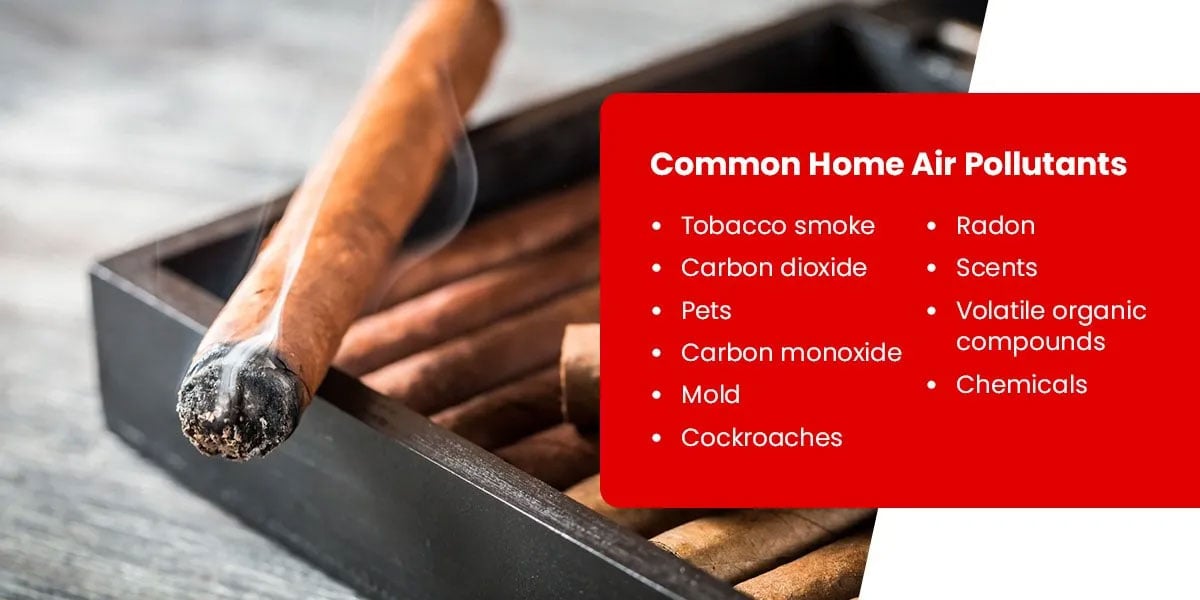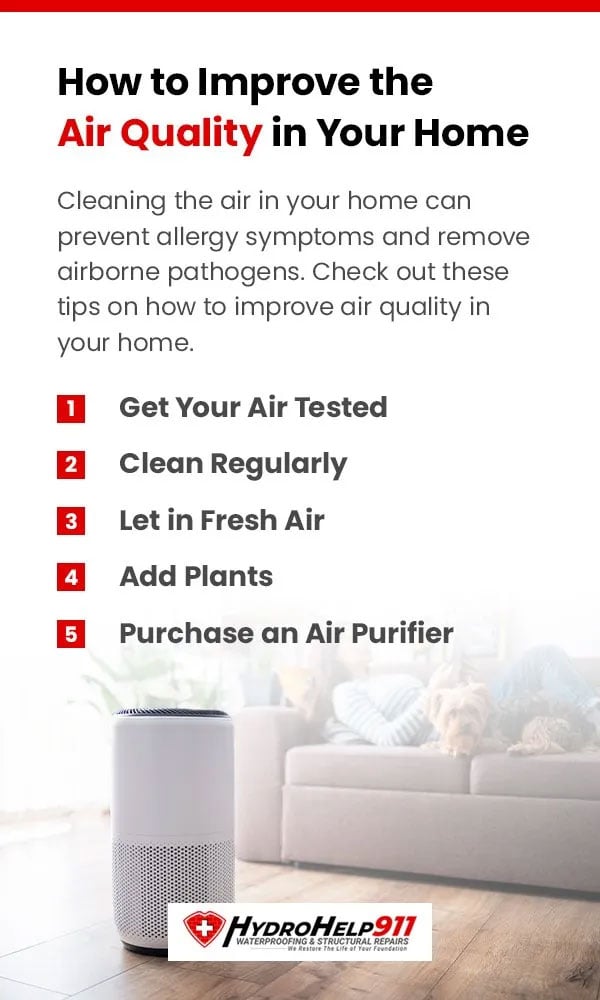Many people consider good outdoor air quality essential. It can contain harmful pollutants that negatively impact your well-being. What many don’t realize is that your home’s indoor air quality is just as crucial as outdoor air quality. Sometimes, it might be worse than the outdoor air quality, impacting your comfort and health.
Check out this article to learn more about indoor air quality, its importance, the signs of poor air quality and tips for how to improve home air quality.
The Importance of Indoor Air Quality
Many homeowners look for ways to improve air quality in their homes because of its effects on their comfort and health. Poor air quality can cause headaches, trouble concentrating, eye, nose, throat and lung irritation and fatigue. Allergies and asthma may worsen, and prolonged exposure to harmful gases or chemicals can be fatal.
For instance, radon does not cause immediate symptoms but can lead to cancer after many years of exposure. Many factors affect indoor air quality, including poor ventilation, humidity, temperature control, recent remodeling and the prevention of fresh air from entering a building.
Signs You Have an Air Quality Problem
While bad smells can be a clear sign you have an air quality problem, the signs are not always so overt. Some common signs that you have an air quality problem and need to improve your indoor air quality include:
- Strange or musty odors
- Eye, nose and throat irritation
- Fatigue
- Dizziness
- Headaches
- Coughing
- Sneezing
- Skin irritation
- Congestion
Common Home Air Pollutants
Before improving the air quality in your home, you need to learn what the typical indoor air pollutants are. They include:
- Tobacco smoke: Smoke from cigars, cigarettes and pipes is one of the most common and dangerous indoor air pollutants. Secondhand smoke contains more than 7,000 chemicals, of which hundreds are toxic and 70 can cause cancer.
- Carbon dioxide: High levels of carbon dioxide can cause headaches, confusion and fatigue.
- Pets: Most people with pet allergies are allergic to pet saliva, urine or dander, which may collect on multiple surfaces. These surfaces include furniture, walls, flooring and clothing.
- Carbon monoxide: Gas combustion in appliances like stoves, furnaces and water heaters creates carbon monoxide. It’s odorless and colorless and can cause unconsciousness or death with heavy exposure. Some fire alarms come with carbon monoxide detection to warn inhabitants of dangerous levels.
- Mold: This fungus exists indoors and outdoors. Outside, it might be on rotting wood, grasses, grain and damp leaves. Inside, it can be in moist, humid areas of your home, near sinks or water leaks, in the soil of houseplants and on produce. If you disturb the source, mold spores can enter your sinuses and lungs through the air.
- Cockroaches: Cockroaches may cause asthma and allergy symptoms whether alive or dead. They like damp, warm places near food and water sources.
- Radon: Radon is a colorless, odorless gas that can enter your home through foundation cracks, well water, floor and wall joints, sump pump openings and floor drains.
- Scents: Any scent can trigger asthma symptoms. This includes candles, potpourri, perfumes, air fresheners and wax warmers.
- Volatile organic compounds: Some items in your home might release gases called volatile organic compounds (VOCs). VOCs can be two to five times higher indoors and cause short-term effects, such as headaches, nausea and eye, nose and throat irritation. The sources of VOCs include new furniture, mattresses, carpet and building materials, paint, air fresheners and cleaning supplies.
- Chemicals: Cleaning products contain chemicals that may release toxic fumes into the air. These chemicals might cause respiratory distress or asthma.
How to Improve the Air Quality in Your Home
Cleaning the air in your home can prevent allergy symptoms and remove airborne pathogens. Check out these tips on how to improve air quality in your home.
1. GET YOUR AIR TESTED
HydroHelp911’s indoor air quality testing services help you determine the current levels of gases and molds in your home. Some substances like radon, carbon monoxide and high levels of carbon dioxide aren’t noticeable without testing. The various substances HydroHelp911 can test for include:
- Mold: Our air sample test detects mold. If there is mold, the test shows what kind it is and where it’s at.
- Radon: Radon is the leading cause of lung cancer among non-smokers. Because it’s an odorless, colorless gas, we need to perform a 48-hour test to measure the amount of radon in the air. You need to get your new home tested or your current one if it’s never been tested.
- Carbon monoxide: We use an electronic sensor to detect the amount of carbon monoxide in the air. Our team analyzes the results and discusses the next steps with you.
- Carbon dioxide: If the carbon dioxide levels in your home are unsafe, we’ll recommend solutions.
- VOCs: Some VOCs common in houses are benzenes, chlorofluorocarbons, xylenes and formaldehyde. Our test detects unsafe levels. If we detect any, we’ll inform you and recommend solutions.
2. CLEAN REGULARLY
Regularly cleaning your home minimizes dirt, dust, dander and other particles that might make you sick or cause allergies. Things to clean routinely include:
- Floors and surfaces: Dust, vacuum and mop to clean your floors and surfaces.
- Bedding: Your bedding collects many particles, so washing your sheets and linen often keeps them fresh and debris-free. You can also invest in hypoallergenic pillow covers if dust irritates your sinuses at night.
- Refrigerator and pantry: You need to throw away any produce or food with mold.
- Air filters: When performing maintenance on your HVAC system, be sure to check the air filter. Most homeowners can do this themselves and high-quality air filters can make a big difference in your indoor air quality.
3. LET IN FRESH AIR
You can let in fresh air by opening your windows — just keep allergy season in mind and avoid opening the windows if anyone in your home has a sensitivity to pollen or other outdoor allergens. You might also invest in an air purifier for rooms you spend a lot of time in, like your bedroom.
4. ADD PLANTS
Plants are natural air filters. They convert carbon dioxide (CO2) into oxygen, reducing CO2 levels. Increased oxygen levels provide numerous benefits, including increased productivity, creativity, health and focus.
5. PURCHASE AN AIR PURIFIER
You can get an indoor air purifier to boost your home’s air circulation. It can filter out allergens and dust. Depending on its size, they can clean the air in one room or multiple rooms.
Request Indoor Air Quality Testing From HydroHelp911
If the air quality in your home is causing issues for your and your family, HydroHelp911 can help. We offer indoor air quality testing services to determine the quality of your home’s air. With over 10 years in the industry, we have the experience and reputation to get the job done right.
Contact HydroHelp911 today for home air quality testing so we can recommend the best solution for your problem.








